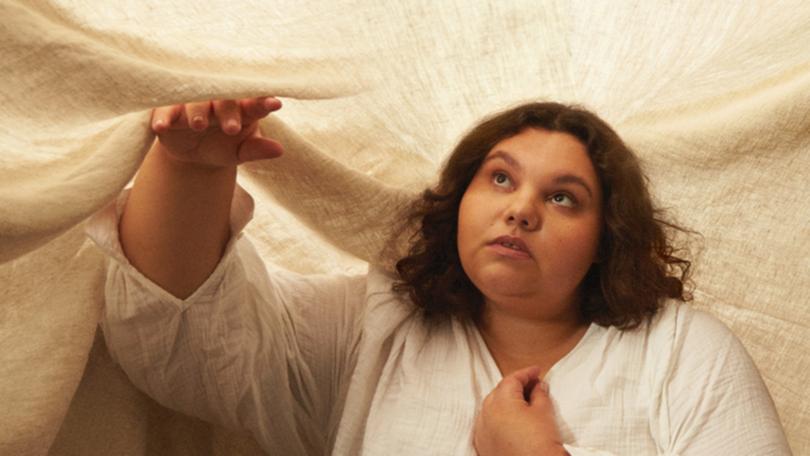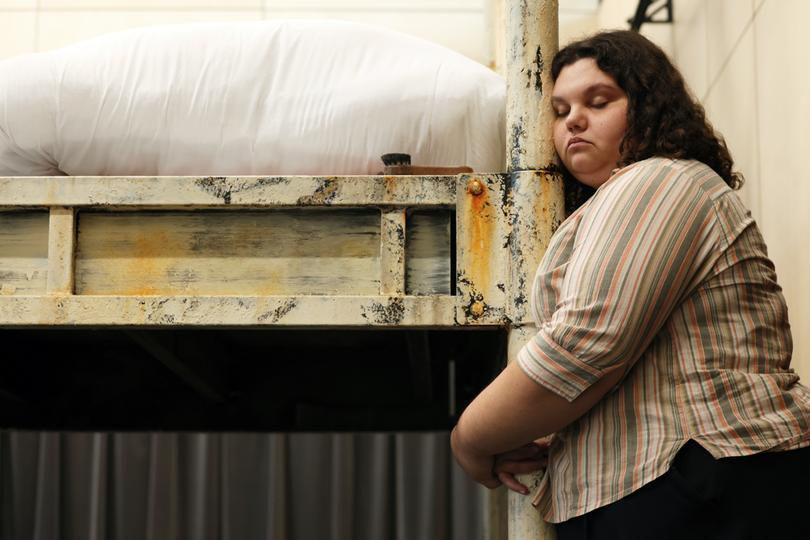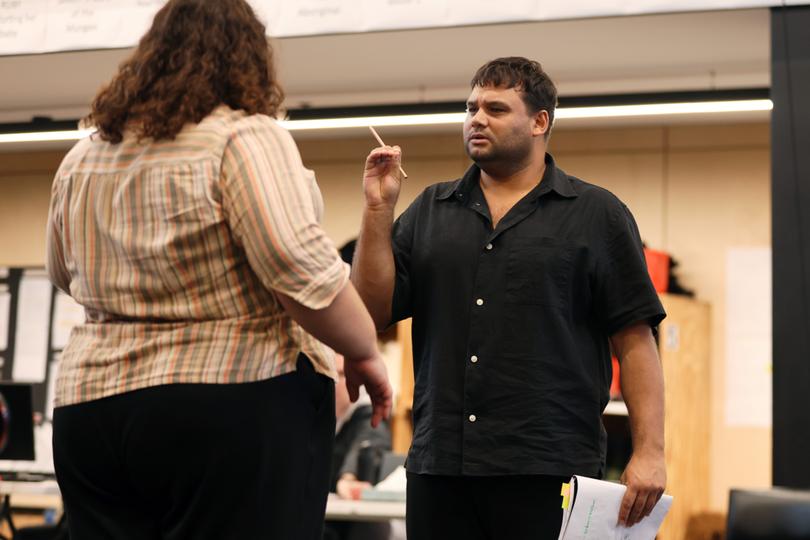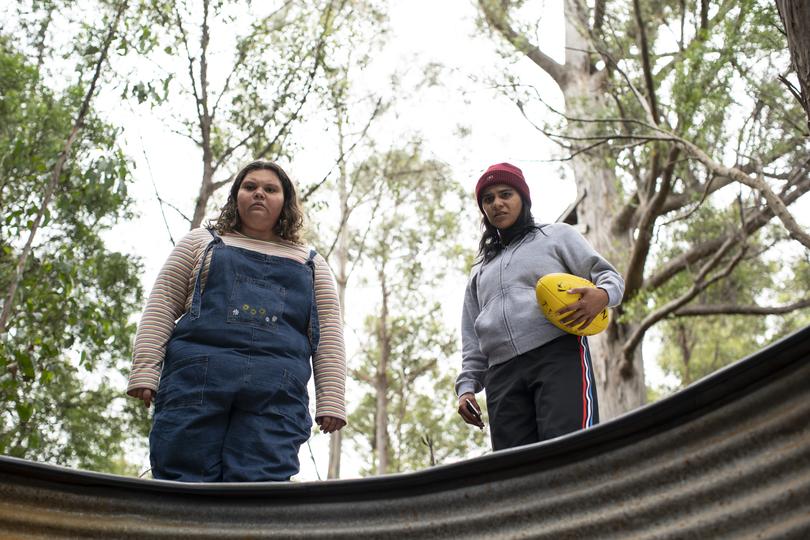Sydney Theatre Company’s Stolen: Kartanya Maynard on the healing power of storytelling
Kartanya Maynard has had a bumper year and in her latest project, she’ll confront one of the hardest stories to tell and hear.

Kartanya Maynard has had an amazing 12 months. A trawlwoolway woman from nipaluna/Hobart, the young actor starred in four major TV productions in the span of a year.
In the middle of 2023, she debuted a new series every month – ABC drama The Messengers, adapted from Markus Zusak’s book in May, crime comedy Deadloch in June and Gold Diggers in July. She then joined the cast of the second season of Heartbreak High, and stole scenes from her castmates as the abstinence advocate Zoe.
Maynard’s rise may seem meteoric, but she had gained notice in the industry. Kate McLennan and Kate McCartney, known as the Kates, called her an “extraordinary actor” and had “kind of” written the part of Miranda for her.
Sign up to The Nightly's newsletters.
Get the first look at the digital newspaper, curated daily stories and breaking headlines delivered to your inbox.
By continuing you agree to our Terms and Privacy Policy.Now, Maynard is returning to the stage. It’s a vibe change from her TV roles, and it’s a deeply personal experience.
Maynard is in rehearsals for the Sydney Theatre Company’s revival of Stolen, Jane Harrison’s seminal 1998 play which tells the stories of five Aboriginal children from the Stolen Generation.

It takes place across time periods, jumping around from when the characters are children, faced with an unknown life away from their families, to when they’re adults, bearing the scars and traumas of lives they didn’t choose.
Maynard plays Ruby, a woman who has endured abuse from white “masters” after being forced into domestic work.
Rehearsals with director Ian Michael have been difficult but not because of creative egos, temperaments or differences. “It’s quite a heavy subject matter that’s affecting all of us Indigenous performers, it’s affecting us deeply,” Maynard told The Nightly.
But even knowing that it would be, Maynard never hesitated in getting involved. She understood the significance of the production.
“This is one of the most important Indigenous plays ever written, and this is my opportunity to be part of its incredible legacy,” she said. “But also to be a voice for so many members of the Stolen Generation who never got to tell their story. To be part of that healing in this small way is important to me.
“[I knew] this was going to be big and it was going to be hard, but it’s hard in a way that some of the best healing feels like a mountain to climb at first, and then you hit the peak and you see where you’ve come from and where you’re going, and you feel better for it.”
The power of storytelling as a conduit for healing is a guiding force. Theatre is an intimate collective space in which the performers and the audience share the same air, sit under the same lights and have no physical barrier to separate them.

It can be confronting, but there’s also nothing else like it in inviting a wider audience into a pocket universe that, through art, reflects Australian humanity.
“Plays like this are very similar to the stories that we pass down as a community because they’re there for us to process things that have happened to us,” Maynard said. “Through that process, we know what went wrong and we are able to then advocate for ourselves to those that have hurt us. This is what you’ve done and these are the steps you need to take so that this does not happen again because it shouldn’t happen again.
“We, as Aboriginal and Torres Strait Islander people use storytelling to fight for our rights as people.
“No matter how far in time we are away from the Stolen Generation, it will always affect us and generations to come. Trauma becomes generational, and although it may not be the exact same thing that happened, it morphs and changes and affects different generations in different ways.”
Maynard has a stronger connection to Stolen than most. Her cousin, the late Elliot “Bucky” Maynard, was in the company of Stolen’s 2000 tour. Maynard felt as if her involvement in this 2024 production was a passing of the torch. But it comes with a cost.
She can normally shake off her characters when leaves work, but “on this, that’s been significantly harder”.
Maynard added, “I’ve been going home and ruminating on everything that happened in the day, but also then thinking about my own family’s story when it comes to the Stolen Generation, and also worrying about my fellow cast members.”
But the production has been very mindful of everyone’s wellbeing. Maynard said Michael, who is directing Stolen as his second STC production after the well-received Constellations, has been completely supportive and can sense when his cast needs a break to do movement exercises or goof off.

There’s also an Indigenous psychologist, Mary, who is always on hand and proactively checks in on them.
“I had a day when I didn’t even realise that I was struggling and Mary spoke to all of us and she pointed out a couple of things and I realised, ‘Oh, actually, I was having trouble with that scene on a personal level’. So, sometimes, the care is just being made aware you might feeling something that your body or mind isn’t letting you think about.”
Stolen won’t be a breezy, lean-back experience for audiences either. Maynard said she expects the Indigenous members of the audience will find it hard to sit through, that it might bring up memories or emotions from stories they’d heard from their family and mob. And for non-Indigenous audiences, there will be valuable knowledge.
“A lot of people think they understand or they know what happened to the Stolen Generation but they have no clue. And it’s very different reading about something than it is to hear it from an Elder’s lips or to see a play that was inspired by stories of the Stolen Generation, to see it acted out in front of you.
“I think there will be a lot of people crying, a lot of people will be so angry they won’t know what to do. All of these feelings are valid because strong emotions are what is needed.”
But through the hardship, there will be insight, clarity – and healing.
Stolen opens at the Sydney Theatre Company on June 11 with previews from June 6.

